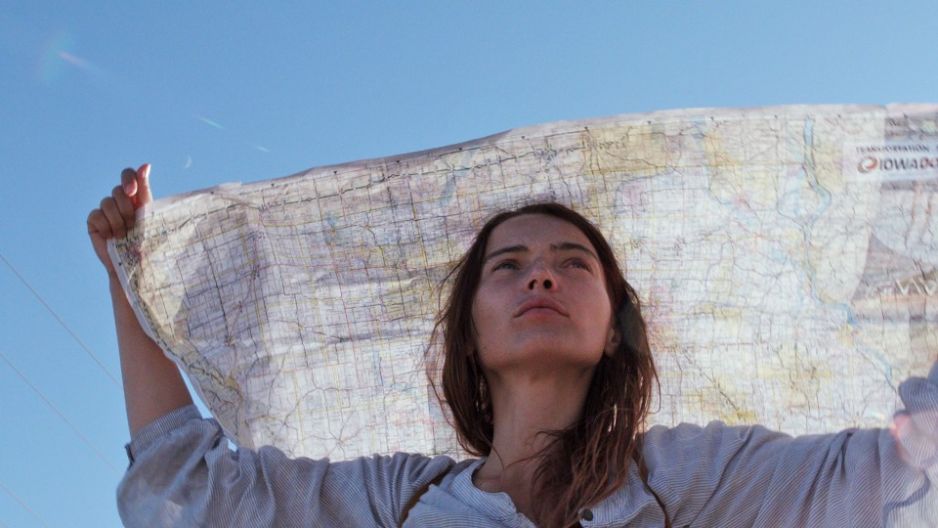
Dir.: Andreas Horvath; Cast: Patrycja Planik, Chris Shaw, Albert Lee; Austria 2019, 130 min.
Austrian filmmaker Andreas Horvath (Earth’s Golden Playground) has restaged the journey of the real Lillian Alling, who in 1926/27 tried to walk all the way from New York to her homeland country Russia. Debutant Patrycja Planik plays the gritty modern day heroine, who crosses the sub-continent without saying a single word.
We meet Patrycja, a woman in her early thirties, when she gives her photos to an ‘adult’ film producer, who declines the offer. “These are photos for modelling, we do hard core, your visa has run out and you don’t speak English”. In the background we see graphic examples of his trade, they could be straight out of one the documentaries of the feature’s producer Ulrich Seidl. “Go back to Russia” is the producers advise, and Patrycja takes him by his word. She breaks into a house near New York, finds a map and a huge jar with cheese balls, and sets off for her journey across he USA and Canada. When her shoes are ruined in a stream, she steals a pair from one of the many flea markets she visits, as well as from an abandoned laundrette. She sleeps in dilapidated houses and odd dwellings on the way. She even manages to bed down in drainage pipes and under viaducts, greeted in the morning by stray cats. Scavenging for food, she steals a watermelon and eats pizza from a garbage can, and joins the kids in picking up sweets from the 4th of July parade. Hardly anybody bothers her: she looks so needy and poor, nearly always flying under the radar.
There are two encounters which are stand out: In Iowa she accosted by an elderly would-be rapist (Shaw), who chases her in vain across a corn field. Alone again, she steals a scarecrow’s shirt. In Nebraska, a sheriff (Lee) picks her up for vagrancy and treats her like a hardened criminal: she has to put her hands on the hood of his car, whilst he searches the meagre content of her bag. Later he relents, even giving her his warm sheriff’s jacket. This is the only kindness she ever experiences, before he drives her to the boundary of his county.
Whilst the landscape is breath-taking beautifully, Trump’s heartland seems emotionally dead. Somehow time has stood still in the mid-Fifties of the last century. Most people have fled to the cities, the remainers adamant to keep to the lifestyle of the era long gone by. We watch a parody of a rodeo, and a demolition derby with cars who were unfit to drive even a century ago. There are lots of religious slogans everywhere: “Smile, your Mum chose life” or “Where is your family?”. Instead of mobiles, old-fashioned two-way walky-talkies are still en vogue. After a hail storm, which she survives in an ambulant toilet, Patrycja again freshens her wardrobe up in a cloth donation bank.
Her journey comes to an end at the Yuka river, were she tries in vain to drag a canoe into the river, to continue her journey. This enigmatic ending works well with an allegoric story about men and whales: we never find out who Patrycja really is, there is no background, just a very very determined young woman, bashing on again and again with a spirited resistance to nature and everyone she meets: untouched through her ordeal, like a woman who fell from the sky.
Horvath’s photography is always dazzling, accompanied by a sparse musical score to replace the dialogue, which never materialises. Lillian is a triumph of a spirited, enigmatic women, wandering through a society, where emotions and ideas have long died. AS
CANNES FILM FESTIVAL | QUINZAINE DES REALISATEURS